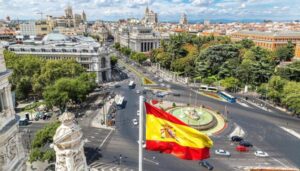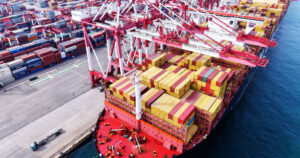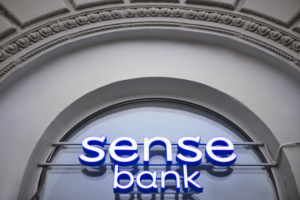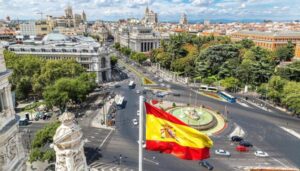
Spain’s GDP grew by 0.6% in the third quarter of 2025 compared to the previous three months, according to preliminary data from the national statistics agency INE. Economic growth compared to the same period last year was 2.8%.
Analysts had forecast an average increase of 0.6% for the first indicator and 3% for the second.
The pace of growth slowed: in the second quarter, GDP rose by 0.8% quarter-on-quarter and 3.1% year-on-year.
Consumer spending in Spain rose by 1.2% in July-September compared to the previous quarter, business investment by 1.7%, and government spending by 1.1%.
Exports of goods and services fell by 0.6%, while imports rose by 1.1%.
Industrial production rose by 0.5%. The services sector showed an increase of 0.8%, and the construction industry also rose by 0.8%.
http://relocation.com.ua/vvp-ispanii-v-iii-kvartali-zris-lyshe-na-06/

In September, the Chinese economy showed higher-than-expected growth rates in industry and retail trade, indicating a gradual recovery in domestic demand and business activity.
According to the National Bureau of Statistics of China, industrial production grew by 6.5% year-on-year, the highest rate since June. In August, growth was 5.2%, and analysts had expected a slowdown to 5%.
The largest contributors were:
manufacturing — +7.3%,
mining — +6.4%,
oil and gas — +8.9%,
automobile production — +16%,
computers and telecommunications equipment — +11.3%.
Growth was recorded in 36 of 41 sectors of the economy. Overall, industrial production increased by 6.2% in the first nine months of 2025 compared to the same period last year.
Retail sales in September grew by 3% year-on-year. This is slightly less than in August (3.4%), but still better than analysts’ forecasts (2.9%).
The largest increases were in sales of food products (+6.3%), jewelry (+9.7%), and clothing (+4.7%). Car sales rose by 1.6%, while petroleum product sales fell by 7.1%.
Since the beginning of the year, retail turnover has reached 36.6 trillion yuan (about $5.1 trillion), which is 4.5% more than a year earlier.
Investments in fixed assets as a whole declined slightly, by 0.5%, mainly due to a decline in the construction sector (-13.9%). At the same time, investments in infrastructure and manufacturing grew by 1.1% and 4%, respectively.
The unemployment rate in September fell to 5.2% from 5.3% a month earlier.
Experts from the Experts Club analytical center note that the Chinese economy remains stable despite the slowdown in global demand and difficulties in the real estate sector.
Reference: Experts Club.
For several years now, China has ranked first in the world in terms of economic size, calculated in terms of purchasing power parity (PPP), ahead of the US and the EU. This confirms its status as the largest industrial and consumer center on the planet.

Small and medium-sized businesses (SMEs) remain the foundation of post-war economic recovery, and this segment will be the focus for Sens Bank in 2025–2026, said Yana Shumunova, director of the SME department, in an interview with Interfax-Ukraine.
“We are seeing growth in demand for loans to restore logistics, purchase equipment, and implement energy-efficient solutions. This is the foundation for the return of Ukrainian business to sustainable growth,” she said.
The bank is also strengthening its cooperation with the EBRD and international funds to expand SME lending programs.
Sens Bank is a Ukrainian universal bank specializing in the corporate and retail segments. After coming under state control, the bank is transforming its business model, focusing on technology, transparency, and support for SMEs.

According to Serbian Economist , Spain’s economy grew by 0.8% in the second quarter of 2025 compared to the previous three months, according to final data from the national statistics agency INE. The increase in GDP compared to the same period last year is 3.1%.
Consumer spending in Spain in April-June grew by 0.8% compared to the previous quarter, business investment by 1.8%, and government spending by 0.1%.
Exports of goods and services rose by 1.3%, imports by 1.6%.
Industrial production increased by 0.9%, the service sector showed an increase of 1%, and the construction industry by 2.3%.
In the first quarter, the country’s GDP grew by 0.6% quarter-on-quarter and by 2.8% year-on-year.

This article presents key macroeconomic indicators for Ukraine and the global economy as of the end of May 2025. The analysis is based on current data from the State Statistics Service of Ukraine (SSSU), the National Bank of Ukraine (NBU), the International Monetary Fund (IMF), the World Bank, and leading national statistical agencies (Eurostat, BEA, NBS, ONS, TurkStat, IBGE). Maksym Urakin, Director of Marketing and Development at Interfax-Ukraine, Candidate of Economic Sciences and founder of the Experts Club information and analytical center, presented an overview of current macroeconomic trends.
Ukraine’s macroeconomic indicators
The first five months of 2025 saw a modest recovery amid high uncertainty. According to preliminary estimates by the State Statistics Service, Ukraine’s real GDP grew by 1.1% y/y in the first quarter of 2025 (seasonally adjusted: –0.3% q/q), reflecting the fragile but still positive dynamics of domestic demand and the adaptation of businesses to wartime conditions.
Inflationary pressure intensified in May: annual inflation accelerated to 15.9% (month-on-month: +1.3%), mainly due to a jump in food prices and the impact of energy factors. The NBU directly pointed to seasonal and supply factors and at the same time expects a slowdown in the summer months.
Against this backdrop, the NBU Board consistently maintained the policy rate at 15.5% per annum in March, April, and June, emphasizing the priority of anchoring inflation expectations and exchange rate stability.
Foreign trade in goods remained in deep deficit in January–April: exports amounted to $15.8 billion, imports to $29.3 billion, and the negative balance to about $13.4 billion. During the same period, exports of services amounted to $12.7 billion, imports to $7.4 billion. Structurally, imports are dominated by fuel, machinery, and transport, while commodity exports are concentrated in raw material groups.
Despite the trade gap, international reserves reached historically high levels at the end of May, amounting to $44.5 billion as of June 1, 2025 (thanks to official receipts and NBU operations).
At the same time, the debt burden is high: total public and guaranteed debt as of May 31, 2025, was $180.97 billion (7.52 trillion UAH).
“The current macro dynamics are more like driving with the handbrake slightly engaged: the economy is capable of moving, but without acceleration. The positive aspect is that we are maintaining growth and gradually curbing inflation. The negative aspect is the sources of this balance: reserves and external inflows are replacing investments and export revenues. If we do not convert record reserves and access to international programs into an investment impulse in manufacturing, energy, and logistics in the summer, we will have to extinguish structural fires in the fall, rather than price fires,” notes Maxim Urakin.
The expert also emphasizes the quality of demand. According to Urakin, consumption is reviving, but it is fragile and uneven — it is being sustained by the IT sector, services, and part of trade. Industry without major infrastructure repairs, cheap long-term money, and access to ports is like an engine running at minimum speed.
“Add the risks of energy during peak periods, and we get an economy that needs not isolated injections but systemic therapy: insurance of military risks for investors, fast ‘windows’ for importing equipment, duty-free corridors for exporters, and large-scale public-private partnership projects. Otherwise, we will preserve the trade deficit and dependence on external financing,” the economist stressed.
Global economy
The global picture at the end of May 2025 remains mixed. In its April WEO, the IMF forecasts global economic growth of around 2.8% in 2025, with a further decline in inflation, but with risks related to geopolitics and trade protectionism remaining.
After overheating in 2024, the US saw negative GDP growth in the first quarter of 2025: according to the BEA’s second estimate, a 0.3% decline in annual terms, explained by a sharp increase in imports and a reduction in government spending; domestic final demand remained stable. In May, core PCE inflation remained close to 2.6% y/y, and the Fed kept the rate range at 4.5–4.75% at its meeting on May 1 (in June, it continued its cycle of moderate easing).
China reported official GDP growth of 5.4% y/y (1.2% q/q) in Q1, supported by industry, transport, and IT services; at the same time, the real estate sector remains a restraining factor.
The European economy is gradually emerging from stagnation. In its spring forecast, the European Commission expects GDP growth of 1.1% in the EU and 0.9% in the eurozone in 2025; inflation is converging with the ECB’s target. The first quarter provided positive momentum: eurozone GDP grew by 0.4% q/q.
The UK was a pleasant surprise for the G7: +0.7% q/q in Q1, and on May 8, the Bank of England lowered its rate to 4.5%, maintaining cautious rhetoric due to inflation risks.
Turkey continues to experience a combination of growth and high inflation: in Q1 2025, GDP grew by 5.7% y/y, while inflation in May stood at 35.4% y/y despite tight monetary policy.
India maintains high momentum: according to official data, in the fourth quarter of the 2024/25 fiscal year (January–March 2025), real GDP grew by 7.4% y/y; for the entire fiscal year, the government estimates growth of approximately 6.5–6.9%.
Brazil added 1.4% q/q (2.9% y/y) in the first quarter, but inflation remained high in May — around 5.3% y/y, forcing the central bank to maintain tight financial conditions.
“The world in May 2025 is a multi-speed economy. The US is cooling down with negative Q1 statistics, but demand and the labor market are still driving growth. Europe, despite low growth rates, is on a trajectory consistent with its inflation target; the UK is showing resilience; China is holding steady at 5%+, but with weak private demand; India is the clear leader in terms of growth among the major economies; Turkey is experiencing high inflationary turbulence; Brazil is growing, but paying dearly for it,” comments Maxim Urakhin.
According to the expert, for Ukraine this means a new configuration of opportunities: cheaper global money will not appear quickly, but the “window” for investment in the relocation of production, energy, and defense-industrial chains is already open.
“The main thing is to design growth not as a simple restoration of the pre-war structure, but as a leap in productivity: processing instead of raw materials, logistics with high added value, digital services, and engineering that are export-scalable. Then macrofinancial stability will cease to be fragile and will become a platform for development,” added the founder of Experts Club.
Conclusion
In January–May 2025, the Ukrainian economy is in a mode of sustained stabilization: moderate annual growth at the start of the year, inflation peaking in May, record reserves, and high debt burden. The strategic choice is to transform external support and import resources into a source of investment in productivity and exports. The global context is asymmetrical and risky, but it opens up niches where Ukraine can grow faster than the world if it focuses on structural projects and policies that convert stability into development.
A more detailed analysis of Ukraine’s economic indicators is available in the monthly information and analytical products of the Interfax-Ukraine agency, Economic Monitoring.
Head of the Economic Monitoring project, Candidate of Economic Sciences Maksim Urakin

The Finnish group Olvi has signed an agreement to acquire Bosnia and Herzegovina’s largest brewery, Banjalucka Pivara, including its subsidiary in Serbia, according to the Serbian Economist Telegram channel.
The exact name of Banjalucka Pivara’s Serbian subsidiary has not been disclosed. Publications indicate that Olvi has acquired both the brewery itself and its Serbian subsidiary, expanding its presence throughout the Balkan region and gaining access to the markets of Serbia and Montenegro.
Financial and product indicators for Banjalucka Pivara (Bosnia and Herzegovina):
1. Revenue in 2024: approximately €28 million.
2. Profitability: the company is consistently profitable with growing market shares in the region.
3. Brands: including the popular Nektar, the fastest growing in all countries in the region.
By acquiring Banjalucka Pivara and its operations in Serbia, Olvi strengthens its regional network and gains access to the Balkan markets, as well as logistics corridors to Mediterranean tourist destinations.
The merger allows the Finnish company to develop its product range (non-alcoholic beverages, cocktails), strengthening its range at Banjalucka Pivara’s facilities.
The transaction is awaiting approval by the Bosnian antitrust authorities and is expected to be completed no later than the first quarter of 2026.
Source: https://t.me/relocationrs